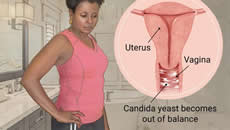Vaginal Yeast Infection
 | Vaginal Yeast Infection (Thrush) also called candida vulvovaginitis is a yeast infection of the vagina and tissues at the opening of the vagina (vulva). This type of yeast infection is caused by the fungus candida. |
What is it?
- Thrush is a common condition that is caused by a type of fungal infection
- “Candida” species can be normal flora and therefore not need treatment if asymptomatic
- Can be sexually transmitted but is not considered an STI
- Can arise spontaneously or secondary to disturbance of vaginal flora e.g. antibiotic therapy
- Vaginal thrush can affect women of any age, but is more common between the ages of around 15 years to 50 years old
- It is unusual in girls before they have begum their periods or in older women after the menopause
Signs and Symptoms
Up to 20% of women do not experience noticeable symptoms. If there are any symptoms, you may experience:
| Male | Female |
| Red rash on genitals, especially under foreskin, may or may not be itchy | White 'curd like' vaginal discharge although discharge can appear normal |
| Swelling of foreskin if severe | Genital/vulval itch, discomfort |
| Fissures | Superficial dyspareunia |
| Superficial erosions | External dysuria |
| Excoriation, erythema, fissures, swelling |
Diagnosis
Your GP will examine you and take a swab or do further tests to confirm the diagnosis. If you get thrush a lot, the GP may also want to rule out a medical condition like diabetes or HIV.
If you have had thrush before and treated it successfully, but it was more than 6 months previously, then it is fine to treat it yourself without seeing a GP.
Treatment
The treatment of thrush is usually very simple. The most effective treatment is pessaries inserted into the vagina at night. Other options are tablets that are taken by mouth and creams that are applied to the skin around the vagina.
These medications contain anti-fungal medicines such as clotrimazole, miconaxole, fluconazole and nystatin. They are available over-the-counter at a pharmacist and can also be prescribed by your GP.
You can also buy over the counter creams to relieve the soreness and itchiness around your vagina. Ordinary moisturiser can also help.
In most cases, treatment will relieve the symptoms. However, some women may have recurrent thrush and others seem to get it almost continually. In these instances, GP may prescribe longer courses of treatment.
You should avoid taking thrush treatments by mouth if you are pregnant or breastfeeding and use one of the other methods instead. Treatment is not usually needed for a sexual partner of someone who has thrush.
Recommended follow-up
- Not required if symptoms resolve
- Re-testing is recommend for patients if their symptoms persist or recur, as it is important to confirm diagnosis and establish a pattern
- Consider testing for other STIs, if not undertaken at first presentation or re-testing post window period